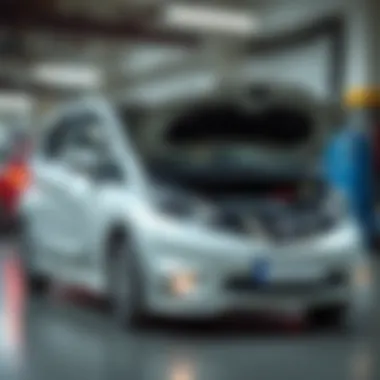Battery Insights for the 2015 Nissan Versa Note


Intro
When we talk about the 2015 Nissan Versa Note, it's easy to get lost in the myriad of features that this hatchback has to offer. However, amidst the high-tech gadgets and efficient design, one critical aspect often slips under the radar: the battery. A trusty battery doesn't just power the vehicle; it’s the very lifeline that ensures your car performs optimally.
Battery management is not just about convenience; it plays a significant role in the longevity and reliability of the Versa Note. In this section, we delve into the essentials of battery considerations, detailing specifications, common problems, and maintenance tips that every owner should be aware of. With this knowledge, Nissan Versa Note owners can better equip themselves for a seamless driving experience that stands the test of time.
Vehicle Review and Assessment
Overview of Specifications
The 2015 Nissan Versa Note is powered by a 1.6-liter four-cylinder engine, renowned for its fuel efficiency and compact size. When inspecting the battery, it’s essential to take note of its specific dimensions, which typically fall within a group size of 24F. This alignment ensures that you select a compatible replacement that fits snugly and functions properly.
Performance Metrics
Battery performance directly correlates with your car's efficiency. A fully charged battery provides smooth starts, reliable electrical system function, and peace of mind on the road. However, if the battery starts showing symptoms such as slow engine crank, it’s crucial to address it before it affects overall performance.
Interior Features and Comfort
While this discussion isn't primarily about interior details, it is worth noting that the 2015 Versa Note's infotainment system relies heavily on a functional battery. A strong battery ensures that features like Bluetooth connectivity and audio systems work without hiccups, thus enhancing comfort during your drive.
Safety Ratings and Features
The battery plays a vital role in the safety systems of the vehicle, powering essential functions like airbags and electronic stability control. A failing battery can compromise these critical safety features, making it imperative for owners to remain vigilant about battery health and performance.
Fuel Efficiency and Environmental Impact
A well-maintained battery can enhance fuel efficiency, as an optimal battery facilitates better engine performance. Moreover, by regularly checking and maintaining your battery, you contribute positively to the vehicle's overall environmental impact through improved emissions.
Test Drive Experience
Driving Dynamics and Handling
When taking a 2015 Nissan Versa Note for a spin, the smooth interplay between engine power and battery efficiency gives it an edge. The handling is responsive, and a reliable battery supports the dynamic performance that drivers come to enjoy.
Comfort and Ergonomics
Like a well-tuned orchestra, the interior features of the car come together seamlessly when everything functions as it should. The battery, by powering these conveniences, inevitably affects the overall comfort of the driving experience.
Noise and Vibration Levels
A good battery can help reduce vibrations and improve the serenity of your drive. A weak battery might contribute to unintended noise, affecting the quality of the ride. Hence, regular checks can maintain the tranquility that comes with driving a Nissan Versa Note.
Performance in Varying Conditions
Whether it's sweltering summer days or brisk winter mornings, your battery is put to the test. It's critical to ensure that your Nissan's battery is robust enough to handle these fluctuations efficiently.
Real-world Usability
In day-to-day use, from commutes to weekend errands, the reliability of the battery becomes evident. A dependable battery translates to fewer worries and smoother trips.
Comparison against Similar Models
Side-by-Side Specification Comparison
When evaluating the 2015 versa Note against models like the Honda Fit or Toyota Yaris, one notable aspect is the specification and performance of the batteries. Each model has its own advantages, but the ease of finding compatible replacement batteries is often a deciding factor.
Pricing Analysis and Available Packages
The pricing of the 2015 Nissan Versa Note, when compared to competitors, can help prospective buyers see the value. Often, the cost of maintenance, including battery-related expenses, influences long-term ownership value.
Unique Selling Points of Each Model
While the Nissan Versa Note excels in fuel efficiency, finding a balance with battery performance is crucial when weighing options against similar models.
Customer Perception and Brand Loyalty
Many owners report a strong affinity for Nissan due to its reliability, including battery performance. Your battery choice can reinforce these perceptions, making careful consideration all the more important.
Resale Value Projections
Well-maintained batteries can enhance resale value. Buyers often look for a vehicle that shows evidence of good care, including regular battery checks and replacements.
Automotive Technology Trends
Current Innovations and Features
With advancements in battery technology, newer models may offer features that greatly enhance battery life and efficiency. Exploring these features can be beneficial for those considering a Versa Note as it ages.
Impact of Technology on Driving Experience
Modern batteries increasingly govern the driving experience through smart technologies. Understanding how these influence your Versa Note can provide deeper insights into maintaining your vehicle.
Future Trends in Automotive Tech
Emerging trends indicate a shift towards more efficient, longer-lasting batteries. While the 2015 Nissan Versa Note may not have these technologies, being aware of them is beneficial for future vehicle purchases.


Case Studies on Technology Implementation
Reviewing other vehicles that incorporate innovative battery technologies can provide useful comparisons for Nissan owners looking to upgrade or maintain their vehicles.
Consumer Reaction to Tech Advancements
The rise of hybrid and electric models brings about discussions on consumer preferences. Observing these trends indicates where the market may shift, impacting choices for long-time Nissan fans.
Car Maintenance Tips
Essential Maintenance Checklists
Regular battery checks should be a staple in your maintenance routine for the 2015 Nissan Versa Note. Pay attention to physical signs of wear, such as corrosion or leaks, and ensure that everything is securely connected.
DIY Maintenance Guides for Owners
Simple tasks like cleaning battery terminals or checking for voltage can prevent further issues. Knowing how to check these aspects empowers owners to take charge of their vehicle's health.
Recommended Service Intervals
Regular inspections, typically every six months or so, can keep your battery in top shape. Consult your owner's manual to align your battery maintenance with other vehicle checks.
Common Issues and Solutions for Specific Models
Familiarity with common battery issues specific to the Nissan Versa Note can save time and money. Owners should be aware of expected battery lifespan and warning signs of impending failure.
This guide aims to arm Nissan Versa Note owners with the tools they need to effectively manage their battery needs, ensuring it remains a reliable driving companion.
Preface to Battery Requirements
When it comes to the 2015 Nissan Versa Note, the battery is more than just a mere component; it’s the heart that powers the entire vehicle. Understanding the battery's requirements is fundamental for ensuring smooth operation and longevity of this model. A solid battery can significantly improve reliability on the road, prevent unexpected breakdowns, and even save you money on repairs in the long run. It’s imperative to choose a battery that not only meets the manufacturer's specifications but also suits your specific driving needs.
Importance of a Good Battery
A good battery plays a critical role in your vehicle's performance. It serves multiple functions, such as starting the engine, powering electrical systems, and enabling the proper function of other vital components within the car. When your battery is in tip-top shape, it boosts your vehicle's efficiency and enhances safety features. A defective battery, on the other hand, might leave you stranded or unable to start your car when you need it most.
- Reliability: A healthy battery ensures that you can depend on your vehicle for day-to-day tasks, whether it's a commute to work or a weekend getaway.
- Performance: Quality batteries can improve engine start-up times, especially in harsh weather conditions, where poor battery performance becomes evident.
- Safety and Convenience: Batteries that hold a stable charge also support the smooth operation of safety systems such as ABS brakes and powering headlights.
Types of Batteries Used in Vehicles
There are several types of batteries utilized in vehicles today, each with its own benefits and drawbacks. The choice among them can make a significant difference in your Nissan Versa Note's performance.
- Lead-Acid Batteries: Traditional and commonly used, these batteries are cost-effective and reliable for most driving conditions. They work well for the Nissan Versa Note and can usually last several years with proper care.
- Absorbent Glass Mat (AGM) Batteries: If you're looking for higher performance, AGM batteries are worth considering. They recharge faster and can handle deep cycles better than conventional lead-acid batteries. This could be advantageous for drivers who frequently use electronic systems in their vehicles.
- Lithium-Ion Batteries: Although less common for traditional vehicles, lithium-ion batteries are becoming increasingly popular due to their light weight, compact size, and longevity, though they come with a higher price tag. They might be suitable for electric versions of vehicles.
- Nickel-Metal Hydride (NiMH) Batteries: These are often seen in hybrid vehicles. While not suitable for the Versa Note, understanding them helps clarify the broader landscape of battery technology.
In summary, selecting the right type of battery not only meets the vehicle's specifications but also enhances performance based on your individual driving habits and conditions. Always consult your owner's manual or a trusted automotive professional before making a choice.
A vehicle's battery is like the fuel of its electric brain; without the right energy, nothing functions properly.
Choosing the appropriate battery and fully understanding your vehicle's requirements will not only extend the lifespan of the battery but also the life of your Nissan Versa Note. Keep reading to explore more on the technical aspects of battery specifications in the following sections.
Understanding the Nissan Versa Note
The 2015 Nissan Versa Note is not just another vehicle on the market; it embodies a unique blend of style, efficiency, and practicality that appeals to a wide range of drivers. Understanding this model is key not only for potential buyers but also for owners wanting to maximize their vehicle's performance and longevity, especially when it comes to battery management.
One of the primary selling points of the 2015 Versa Note is its spacious interior and cargo capacity despite its compact size. This hatchback offers versatility, making it a favorite among those needing a practical daily driver. However, amidst these features lies a crucial aspect that often gets overlooked – the battery. Knowing how the model's design and specs affect battery performance can save owners from headaches down the road.
Overview of the Model
The 2015 Nissan Versa Note stands out with its distinctive design and efficient use of space. Featuring a 1.6-liter four-cylinder engine, it provides a respectable balance of performance and economy. With a fuel efficiency rating of around 31 miles per gallon in the city and 40 on the highway, it's tailored for urban commutes or long distance travels alike.
In terms of technology, this model doesn't skimp on features. Buyers can expect options such as a rear-view camera, Bluetooth connectivity, and upgraded sound systems, all enhancing the driving experience.
However, underneath the shiny exterior and modern tech lies a less glamorous but equally important component – the vehicle’s battery. As a critical power source, a well-maintained battery reflects the overall health of the vehicle. Without it performing optimally, even the most luxurious features lose their allure.
Key Features Impacting Battery Performance
When discussing battery performance in the 2015 Nissan Versa Note, it’s important to consider several key features that can directly influence how well the battery functions.
- Electrical Load: The more gadgets and features your vehicle has, the more electrical load it places on the battery. The Versa Note’s various amenities, including power windows, audio system, and navigation features, draw power from the battery, demanding it to stay robust.
- Battery Size and Type: The type of battery that fits your Versa Note can greatly affect performance. Opting for a battery with the right CCA (Cold Cranking Amps) is essential for ensuring that your vehicle starts smoothly under various conditions.
- Temperature Sensitivity: Batteries can be fickle friends when it comes to temperature. In extreme heat, batteries can lose charge faster, while frigid temperatures can hinder performance. Understanding the local climate can guide owners in selecting a battery that withstands local conditions.
"A battery isn’t just a piece of metal and acid; it’s the heartbeat of your vehicle."
- Charging System: The alternator and the battery work as a team. If there’s an issue with the alternator, it can lead to reduced battery life. Knowing how each part works can help prevent complications in the long run.
Overall, understanding the 2015 Nissan Versa Note involves not just its conventional features but recognizing the underlying factors that contribute to its performance, particularly regarding the battery. Being aware of these elements gives owners an edge in maintaining their vehicle's efficiency and reliability.
Battery Specifications for the Nissan Versa Note
Understanding battery specifications is crucial for every Nissan Versa Note owner. It’s not merely about swapping batteries but ensuring that the one you choose can keep your engine running smoothly and reliably. Choosing the right battery impacts everything from how well your car starts to how efficiently it operates in various conditions. Let's break it down further.
Recommended Battery Specifications
When you're looking for a replacement battery for your 2015 Nissan Versa Note, there are several specifications you ought to keep in mind. The key specifications include:
- Group Size: The correct group size for the 2015 Nissan Versa Note is typically SLA (Sealed Lead Acid) group size 35. Getting this right is essential for proper fit and function.
- Cold Cranking Amps (CCA): For optimal performance, a battery with at least 500 CCA is recommended. This measurement indicates how well the battery can start your engine in cold temperatures.
- Reserve Capacity (RC): Aim for a battery with a reserve capacity of around 90 minutes. The higher the RC, the longer your battery can power the vehicle’s electrical systems when the engine is off.
- Voltage: A standard automotive battery should provide a voltage of 12 volts. Check to ensure compatibility with your vehicle.
Taking the time to ensure these specifications is met can enhance your Versa Note's performance significantly. Good luck on the roads can be tied back to the quality of your battery.


Comparison of Different Battery Types
It’s essential not just to know your recommended specifications but also to understand the variety of battery types available in the market. Here’s a closer look:
- Lead-Acid Batteries: The traditional option, reliable and cost-effective. They work well but may require more maintenance over time. Good for everyday use but may not perform well in extreme temperatures.
- Absorbent Glass Mat (AGM) Batteries: More advanced technology that provides higher performance. These batteries withstand harsh conditions better and often have a higher CCA and RC ratings compared to lead-acid batteries. They are a bit pricier but worth the investment for reliability.
- Lithium-Ion Batteries: Though often used in electric vehicles, some car enthusiasts are exploring this technology for conventional vehicles. They are lighter and offer longer lifespans but might require specialized setups which could complicate replacement.
Each battery type has its own set of pros and cons. When assessing your options, consider not only your immediate needs but also the long-term efficiency and reliability of your vehicle.
In summation, understanding the specifications and types of batteries available for your Nissan Versa Note can directly influence how you experience your vehicle daily. Paying attention to these details isn’t just for mechanics; it’s for every driver who wants to keep their car performing at its best.
Common Battery Problems in Nissan Versa Note
Identifying battery issues in the 2015 Nissan Versa Note can save owners a headache and potentially expensive repairs down the line. Batteries, while often overlooked, play an integral role in ensuring the vehicle operates smoothly. Understanding common problems helps drivers stay ahead of potential failures and ensures the reliability of their vehicle, especially those who depend on their ride for daily commutes or long trips.
Signs of a Failing Battery
Recognizing the signs of a failing battery is the first step toward addressing any issues before they escalate. Here are some clear indicators:
- Slow Engine Crank: When starting the engine, if it seems sluggish or takes longer than usual, it may be time to inspect the battery.
- Dashboard Warning Lights: Many vehicles feature specific lights on the dashboard that indicate battery issues. A battery warning light should never be ignored.
- Corrosion on Terminals: If you see a white, ashy substance around the battery terminals, that’s corrosion. This can impede the battery’s performance and should be cleaned promptly.
- Swollen Battery Case: Extreme temperature changes can cause battery cases to swell or crack. If you notice this, it’s often a sign the battery is nearing its end.
- Frequent Jump Starts: Needing a jump start consistently suggests that the battery is on the decline.
Proactively observing these symptoms can help prevent being stranded or facing larger repair costs in the future.
Potential Causes of Battery Issues
Several factors can contribute to the battery problems a Nissan Versa Note driver might face. Understanding these causes allows for better maintenance and fewer surprises:
- Age of the Battery: Most car batteries have a lifespan of about three to five years. As the battery ages, its performance diminishes, leading to various issues.
- Extreme Temperatures: Both severe cold and blistering heat can impact battery performance. Cold weather can thicken engine oil, making the battery work harder under cold start conditions. Hot weather can oxidize battery plates, undermining their efficiency.
- Parasitic Draw: This occurs when electronic accessories continue to draw power when the car is turned off, leading to a drained battery. Things like interior lights staying on or dashboard displays can cause this.
- Poor Connections: Loose or corroded connections can lead to insufficient electrical flow to the battery, impairing its function.
- Driving Habits: Short trips that don't allow the battery enough time to recharge can also contribute to premature battery wear.
In sum, keeping an eye on these factors and addressing them early can lead to greater battery longevity and reliability, ensuring that the 2015 Nissan Versa Note remains a dependable companion on the road.
"A battery issue doesn’t come with a warning; it sneaks up on you and leaves you stranded. Being mindful of these signs can steer you clear of trouble."
For further reading, consider visiting: Wikipedia on Car Batteries.
Selecting the Right Replacement Battery
Choosing the right replacement battery for your 2015 Nissan Versa Note isn't just a minor detail; it's a crucial decision that directly affects your vehicle's performance and reliability. A battery acts as the heart of your car, providing the necessary power to start the engine and run accessories. Failure to select an appropriate battery can lead to poor performance and short lifespan, leaving you stranded when you least expect it. Therefore, understanding what to look for in a replacement battery is vital for every owner.
Where to Purchase Batteries for Nissan Versa Note
There are various avenues for purchasing a replacement battery for your Versa Note, and each has its advantages. Here’s a rundown of your options:
- Automotive Retail Chains: Stores like AutoZone, O'Reilly Auto Parts, and NAPA often carry a wide range of batteries suitable for different vehicles. They can provide advice based on your model.
- Online Retailers: Websites like Amazon and RockAuto offer a convenient way to shop for batteries. You can compare prices and read reviews without stepping foot outside.
- Dealerships: While often pricier, buying from a Nissan dealership guarantees you get a battery that perfectly fits your vehicle’s specifications. Plus, they may offer installation services.
- Local Mechanics: Many independent mechanics sell batteries. Sometimes they offer competitive prices and are willing to help with installation.
When choosing a purchase point, consider factors like warranty length, return policies, and installation support. It’s worth investing some time into researching to ensure you get a good deal.
Key Factors to Consider
When selecting a replacement battery, several critical elements demand your attention:
- Battery Size: Make sure you select a battery that fits securely in the engine bay. The wrong size can lead to poor connections and mechanical difficulties.
- Cold Cranking Amps (CCA): This rating is crucial, especially in colder climates. CCA measures a battery's ability to start the engine in low temperatures. For the 2015 Versa Note, a battery with a robust CCA rating is recommended to ensure reliable starts in all seasons.
- Reserve Capacity (RC): This value indicates how long your battery can power the car's electrical system in the event of an alternator failure. A higher RC is always beneficial.
- Type of Battery: Choose between lead-acid, AGM, or gel batteries based on your needs. AGM batteries, for instance, are excellent for their durability and performance in extreme conditions, but they come at a higher price.
- Warranty: Don’t overlook the warranty length; it’s a sign of the manufacturer's confidence in their product. A longer warranty often indicates a better quality battery.
"In the world of batteries, you get what you pay for. A quality battery typically saves you money in the long run through durability and performance."
By keeping these factors in mind, you're more likely to find a replacement battery that enhances the performance and reliability of your Nissan Versa Note. Be diligent in your choice, and your cares will thank you!
For further info, you might check these sources: Wikipedia Automotive batteries and NAPA Auto Parts.
Installation Tips for a New Battery
When it comes to installing a new battery in your 2015 Nissan Versa Note, taking the right steps can make all the difference. Not only does a proper installation ensure that your vehicle runs smoothly, but it also safeguards your new battery, extending its lifespan. Therefore, understanding detailed installation tips is critical for anyone looking to swap out their battery. The nuances involved can save both time and money in the long haul.
Preparing for Battery Installation
Before diving into the installation, preparation is key. Start by gathering essential tools that you will need:
- Wrenches or Socket Set: A 10mm socket is usually required for battery terminals.
- Safety Goggles and Gloves: Protecting yourself against battery acid is of utmost importance.
- Cleaning Supplies: Baking soda and water mixed can neutralize any corrosion.
Next, ensure the vehicle is parked on a flat surface and the engine is off. This may seem minor, but it helps to prevent any accidents during the process. Open the hood and locate the battery; generally, it's near the front of the engine compartment. If your engine has plastic covers, they may need to be removed first.
Once all tools are in place and you’ve looked over the battery area, it’s time to check around for any obstructions or dirt that may affect the installation process. A clean workspace is vital as it minimizes the risk of introducing contaminants into the battery terminals.
Step-by-Step Installation Guide
Now that you’re ready, follow these steps for installing your new battery:
- Disconnect the Negative Terminal First: Always start with the negative (-) terminal. Use your wrench to untighten it, and carefully tuck the cable away from the terminal to prevent accidental contact.
- Disconnect the Positive Terminal: Next, loosen the positive (+) cable and ensure it’s also away from the terminal.
- Remove the Old Battery: If there are fastening brackets, take them off. Lift the battery out carefully. Ensure you’re not tilting it, as this can spill any trapped acid.
- Clean the Battery Tray: Before placing the new battery down, wipe the battery tray with a damp cloth. Removing any dirt or corrosion helps ensure a good fit.
- Insert the New Battery: Place the new battery into the tray and make sure it’s aligned properly with the terminals facing the right directions.
- Reconnect the Positive Terminal First: Attach the positive (+) terminal initially, tightening it securely before moving to the negative (-) terminal.
- Final Checks: Make sure the cables are firmly attached and not in contact with any moving parts. Close up the hood securely.
"A little preparation goes a long way. Don’t rush the installation process; take your time to ensure everything is done right."
Once finished, you’ll want to dispose of the old battery responsibly. Many auto parts stores offer recycling services. This step not only helps your local community but contributes to environmental responsibility.
By following these installation tips, you’ll be on your way to keeping your 2015 Nissan Versa Note running smoothly, ensuring you're less likely to face battery-related headaches down the road. It's all about that informed approach!
Maintaining Your Nissan Versa Note Battery


Taking care of your Nissan Versa Note's battery is a vital aspect of vehicle ownership that can't be overlooked. The battery serves as the heart of your car's electrical system. It not only starts the vehicle but also powers every electrical component, from the headlights to the radio. Proper maintenance of the battery can significantly enhance overall vehicle performance, ensuring it runs smoothly without hiccups.
When you maintain your battery, you’re actually prolonging its life and reducing the risk of unexpected breakdowns. A well-cared-for battery can withstand the test of time, especially considering that replacing a battery can be an unnecessary expense if proper care is taken. This section dives into routine maintenance practices and when it might be time to call in a pro for help.
Routine Battery Maintenance Practices
Just like any other part of your car, the battery benefits tremendously from regular maintenance. Engaging in routine checks can help identify and solve potential issues before they escalate into bigger problems. Here are some key practices:
- Inspect the Battery Terminals: Corrosion can build up on battery terminals over time. Ensure they are clean and free from any corrosion. You can often clean them with a mix of baking soda and water.
- Check Fluid Levels: If your vehicle uses a lead-acid battery, check the electrolyte levels. If low, you may need to add distilled water to maintain optimal performance.
- Test Battery Voltage: Use a multimeter to check the battery voltage regularly. Ideally, a fully charged battery should show around 12.6 volts when the car is off and around 13.7 to 14.7 volts when the engine is running.
- Examine for Signs of Wear: Look for cracks or bulges in the battery casing. These may signal a need for replacement before issues arise.
- Ensure Secure Connections: Make sure the terminals are tightly connected to the battery posts. Loose connections can lead to electrical failures.
Routine checks like these can save you from much trouble down the road. They not only keep your battery healthy but can also contribute to the longevity of other electrical components in your Nissan Versa Note.
When to Seek Professional Help
While routine maintenance is crucial, not all issues can be tackled solo. Here are some pointers indicating when it's time to consult a professional:
- Frequent Jump Starts: If you find yourself frequently needing a jump start, it could indicate a failing battery or charging system issue.
- Visible Damage: If you notice any physical damage to the battery, such as swelling or leaking, it's essential to seek a technician's expertise immediately. Continuing to use a damaged battery can lead to further complications.
- Unexplained Electrical Problems: If your car's electronics start acting strangely, like flickering lights or a radio that cuts in and out, it may be time to take your vehicle in for an assessment.
- Age of the Battery: If your battery is nearing the end of its typical lifespan (usually around 3-5 years), even if it seems to be functioning well, consider it for a professional evaluation.
- Strange Smells: If you detect an acrid smell coming from the battery or notice any swelling, that’s a red flag. Don’t hesitate.
A stitch in time saves nine. Early intervention can prevent costly repairs down the line.
By being proactive in maintenance and knowing when to consult professionals, Versa Note owners can ensure their vehicle runs reliably. This knowledge empowers you to protect your investment while enjoying peace of mind on the road.
Impact of Climate on Battery Life
Understanding how climate influences battery life is crucial for owners of the 2015 Nissan Versa Note. Temperature extremes can either drain the battery quicker or affect its overall health. In regions where both heat and cold are prevalent, drivers need to be aware of how these conditions can play out over time. If you live in a consistently warm area, the battery's chemical reactions speed up, which increases wear and tear. Conversely, extremely low temperatures can hinder the battery’s ability to hold a charge.
Adapting to your region’s climate not only supports better battery performance but also enhances your vehicle's reliability. Knowledge of how to prepare for varied weather can ward off unexpected battery failures and extend lifespan.
How Temperature Affects Battery Performance
Temperature profoundly affects battery performance—both on the high and low ends of the spectrum. At high temperatures, the battery may generate more energy, but this comes at a cost. The rate of corrosion increases and electrolyte fluid can evaporate, damaging internal components. An overworked battery in the summer heat might also experience issues, making it crucial to check fluid levels and ensure proper cooling systems are functioning efficiently.
In contrast, when temperatures plunge, the chemical reactions that happen within the battery slow down, leading to a drop in performance. Cold weather means the battery is less capable of providing the power needed to function optimally. Starting your vehicle might become a challenge, and an insufficient charge can cause electrical systems to underperform. Regular checks, especially as seasons transition, are vital to prevent unpleasant surprises.
"Understanding your battery’s reaction to temperature extremes is half the battle in maintaining its performance. Knowing what to expect can save you from roadside troubles."
Adaptations for Extreme Weather Conditions
While you can’t control the weather, you can certainly prepare for its impact on your Nissan Versa Note’s battery. Here are a few practical tips:
- Insulate the Battery: Using insulating wraps specifically made for batteries can help protect against extreme heat and cold.
- Regular Maintenance Checks: Before both summer and winter, have a technician examine your battery's health including the terminals, cables, and fluid levels.
- Park Smart: Whenever possible, park the vehicle in a garage or shaded area during hot spells. For cold weather, keeping it warmer can aid in effective start-ups.
- Keep It Charged: During winter months, consider using a battery maintainer. This role acts like a safety net, ensuring your battery stays at a proper charge level.
- Monitor Your Battery: Invest in a quality battery monitor that gives real-time data on your battery’s health. Early intervention can prevent bigger problems down the road.
These adaptations culminate in a proactive strategy, settting you up for success regardless of what Mother Nature throws at you. Being prepared means you can enjoy reliable performance from your vehicle, no matter the conditions.
By understanding the relationship between climate and battery life, you empower yourself to take better care of your Nissan Versa Note and ensure its longevity.
Innovative Battery Technologies
The automotive landscape has experienced transformative shifts in recent years, particularly concerning battery technology. For owners of the 2015 Nissan Versa Note, understanding these advancements is not just an academic exercise but a necessity for making informed decisions about maintenance and upgrades. Innovative battery technologies not only enhance vehicle efficiency but also promise improved longevity and performance. By keeping abreast of these developments, drivers can optimize their vehicle’s operation, ensuring it runs smoothly while also minimizing environmental impact.
Advancements in Automotive Batteries
Recent years have brought about noteworthy advances in automotive batteries, which are essential for ensuring reliable vehicle performance. One of the most significant advancements is the rise of lithium-ion batteries. These batteries provide a much higher energy density compared to traditional lead-acid counterparts, meaning they can store more energy in a smaller and lighter package. For those with a Nissan Versa Note, this advancement allows for a more fuel-efficient operation, as the engine doesn't have to work as hard to draw power.
Moreover, the adaptation of fast-charging technology in batteries enables quicker recharges, which is a blessing for busy drivers. Imagine being able to recharge your vehicle’s battery in a fraction of the time it usually takes – that could save you a lot of time in your daily routine. Additionally, advanced battery management systems have emerged, which optimize battery charging cycles and monitor battery health, helping to extend the overall lifespan of the battery.
"An optimal battery means fewer headaches down the road for drivers. Understanding the ins and outs of these advancements equips owners with practical insights for better vehicle management."
Future Trends in Battery Technology
Looking forward, the future of battery technology seems quite promising, especially for car enthusiasts and potential buyers of the Nissan Versa Note. One exciting direction involves the exploration of solid-state batteries. Unlike liquid batteries, solid-state versions utilize a solid electrolyte, resulting in a battery that is both safer and more efficient. These batteries not only reduce the risks of leaks and fires but also have the potential for significantly higher energy capacities, which could revolutionize how electric vehicles perform.
In addition, the development of recycling technologies for batteries is gaining traction. With growing environmental concerns, innovative methods to recycle used batteries will ensure that valuable materials can be recovered and reused, thereby streamlining the lifecycle of battery manufacturing and assisting in reducing the carbon footprint associated with battery use.
Furthermore, emerging technologies like vehicle-to-grid systems are set to change how we think about energy use altogether. This allows electric vehicles to feed energy back into the grid, creating a potential new income stream for owners and contributing to sustainability initiatives.
For more information on battery technologies, you can check out resources from Wikipedia and Britannica.
End: Enhancing the Longevity of Your Battery
In the world of automotive experiences, ensuring the longevity of your battery stands out as a crucial aspect. For the 2015 Nissan Versa Note, the battery not only powers your engine but is also the lifeline for every electronic component within the vehicle. Thus, understanding how to care for it can lead directly to a more reliable and enjoyable ownership experience.
Maintaining longevity starts with recognizing the unique specifications and environmental factors impacting your battery's performance. By addressing how to appropriately care for the battery—through routine checks, optimal charging practices, and knowing when to replace—it’s possible to stave off the unforeseen inconveniences that arise from battery failures.
Moreover, by investing time into proper maintenance practices, you can enhance your vehicle's overall efficiency and, in turn, prolong its operational lifespan. This means fewer breakdowns and lower repair costs. Not just that, you also foster better vehicle performance, ensuring that every journey is smooth and reliable.
"An ounce of prevention is worth a pound of cure." Focusing on proactive measures for your battery will pay dividends down the road.
Recap of Key Points Discussed
Throughout this discussion, several key areas were emphasized:
- Battery Specifications: Understanding the unique requirements of the Nissan Versa Note can prevent usage of incompatible batteries.
- Common Problems: Recognizing early signs of battery trouble can save time and money.
- Selection and Installation: Tips on choosing the right replacement and doing the installation safely.
- Maintenance Practices: Regular care can significantly extend battery life.
- Climate Adaptations: Awareness of how environmental conditions can affect battery performance.
These points are vital to keep the battery of your Nissan Versa Note in peak condition.
Final Recommendations for Owners
To wrap it up, consider the following recommendations to keep your battery performing at its best:
- Regular Inspections: Check the battery terminals and wires for corrosion or damage regularly.
- Use Quality Batteries: Always opt for recommended battery brands and specifications, such as the ACDelco Advantage or the Interstate batteries, to ensure compatibility and reliability.
- Climate Preparation: In extreme weather conditions, use battery blankets or maintenance chargers to help bridge the performance gap.
- Stay Informed: Keep up with advances in battery technology and trends that could benefit your vehicle.
Following these insights and practices can strongly enhance the reliability of your Nissan Versa Note battery, ensuring you remain on the road longer with fewer interruptions. For further information and technical advice, resources like Wikipedia, and Reddit provide forums where you can connect with other Nissan enthusiasts and professionals.















